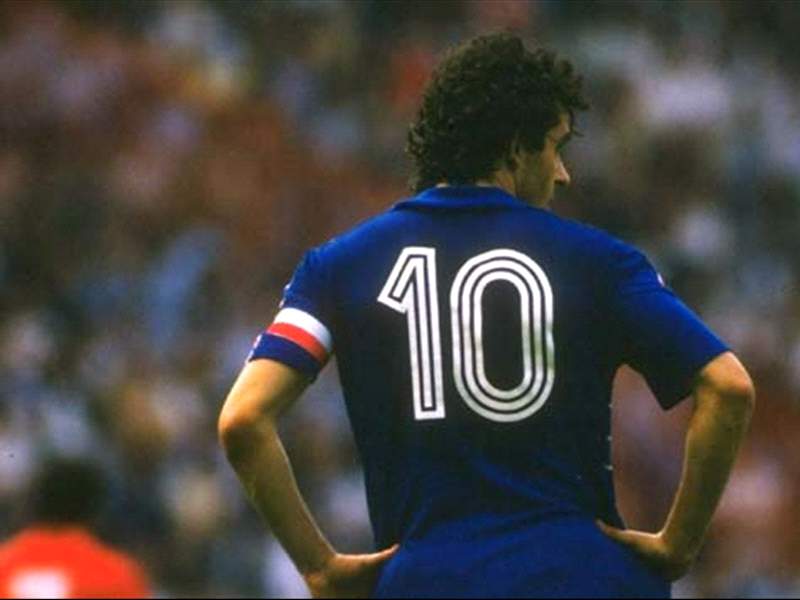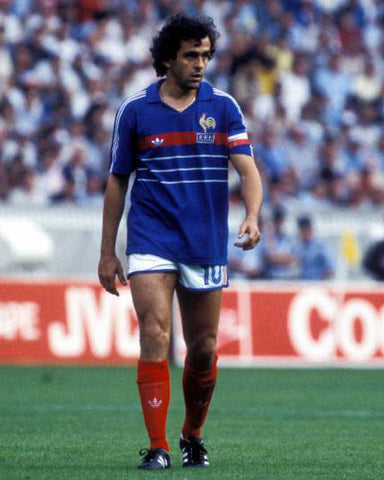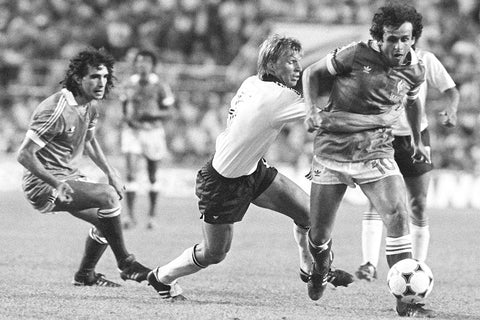
PLATINI, TENLEGEND.
It may be hard for younger fans to comprehend, but Platini is one of football’s greatest legends. In one package Platini became the face of football, a philosophy to be followed and defined an era. He wore an animated expression marked by a carnivorous smile and a half-passive, half-feline look. On the field, Michel Platini was undeniably different.

Before “Platoche” (his French nickname) burst onto the scene, France was one of Europe's most underachieving teams. Their greatest feat in the 20th century to this point was reaching a respectable 3rd in the 1958 World Cup until the 1980’s. A true playmaker and prolific goalscorer, Platini was Europe’s best player of the 1980’s and regarded by many generations of French fans as the greatest ever.

He first made his name as a dead-ball specialist. His precision with perfectly executed free-kicks resulted in the majority of his goals. As he developed, many began to recognize the vast array of this young man's talents, one of which being a panache for passing. In the summer of 1979, when his contract with AS Nancy expired, Platini felt like it was time for a fresh start and a new challenge. He decided to join forces with his former tormentors at Saint-Étienne, since this was the only team in France with a realistic chance and ambition to win a European Cup.
He was by all accounts the definition of the maestro, the conductor for Les Bleus. In a golden age and with the likes of three other fantastic midfielders (Giresse, Tigana and Fernandez composing Le Carre Magique), these men lit a flame in French football. The mark they left on the game is still tangible. Ask any football fan age 40 and above and they will recount how beautifully France played in 82, 84 and 86 with pride. This doesn’t detract from Zizou and his later reign with the Bleus, but it’s safe to say their success was, in part, thanks to an incredible winning mentality created by Platini and his talented teammates.

Platini's style was virtually foreign to that of any French player that came before him. His gift was an amazing predictive ability, spotting the opening before it materialized. His precise understanding for the nature of and his seemingly symbiotic relationship with the ball enabled him to make astonishing passes and take bold shots in open play and dead-ball situations.
“My dad made me understand that football is not a game of ox, that the ball runs faster than the players. It made me understand very early on that we had to see before,” said Platini, "See everything before everyone else: this is the philosophy of "Platoche.”
Perhaps less spectacular than Cruyff or Maradona, he played as well as and made his teammates exponentially better, the whole being greater than the sum of its parts. He was often thought to be nonchalant. In reality, he was calculating, visionary, and generous with gifts of goals for his forwards. His ability was such that Bobby Charlton remarked, "What a playmaker. He could thread the ball through the eye of a needle as well as finish."

Platini’s most memorable games were saved for his national team, however, with whom he fronted one of the best midfield trios of all time, alongside Alain Giresse and Jean Tigana. They came close at the 1982 World Cup, before dramatically losing to West Germany on penalties in the semi-final in a game that has been voted best game ever, and will undeniably be tattooed on the heart and mind of every single French football fan for all time. In the end, the Frenchman was the key player of the tournament as his nation stood cheering with the realization of the LEGEND he would become. He had helped rejuvenate a downtrodden French team and nation, and then in 1982, he made the move to join Juventus.

After a difficult first season, Platini stubbornly chose to stay put at Juventus, and rectify the situation, rather than turn tail and run. As with all the greats, there is an extra ounce of grit and stubbornness that will never accept defeat. Instead, he rallied his teammates, successfully lobbying for a change of tactics which suddenly transformed La Juve into one of the most formidable clubs in Europe.
By the season's close, the Bianconeri ended by winning the Italian Cup, and European Cup runners-up to Hamburg. Individually, Platini was Serie A's top scorer with 16 goals and won the Ballon d'Or, European Player of the Year. In 1984, he produced what was arguably the greatest ever individual performance at an international tournament when he led France to a Euro 84 triumph on home soil with nine goals in five matches.

Platini was the brightest star in the world back then, winning three Ballon d'Ors consecutively in 1983, 1984 and 1985. Football lovers cried with him when France lost in the World Cup semi-finals again in 1986. He had transformed French football from somewhat of an afterthought into one of the strongest teams in the world.
Future France great and Platini-esque player, Zinedine Zidane, would admit to Platini as his idol, stating "When I was a kid and played with my friends, I always chose to be Platini. I would let my friends share between them the names of my other idols." Platini ended up lifting France's first major international trophy in the form of the European Championship, as the tournament's top scorer with a record 9 goals. Platini had cemented his place as a legend in football and the winning of the European championship.
Platini had a strong personality, and was not afraid to speak his mind. He played for the love of the game. And, in 1987, when the passion went away and he got tired of training, the travel, the critics, he retired.
For me, this is about more than just a legendary player. Platini’s impact left a definite mark on every child playing in France during the span of his career. In actuality, the idea behind the TENLEGEND brand story came from his class, elegance, creativity and intelligence with which he played.

As a footballer growing up in northern France in the 70’s and 80’s, watching legends like Platini and Le Carre Magique play had a significant impact on me as a player and is one of the main contributing factors to my love of the game. I watched with childlike wonder and became transfixed. I tried to emulate his every move in practice. In 1980, I received my first Le Coq Sportif kit for Christmas from my parents. It was Platini’s at Saint-Etienne.
I even attended Platini’s football camp in the south of France. In the summer of 1982, I distinctly remember playing with him on the pitch and scoring on a pass from him. This was a euphoric event for me. I can still recall sitting on the grass with him as he talked about his decision to go to Juventus with me and 10 other boys who were just as enamored with the up-and-coming super star.
This experience, and the influence of this man, helped shape and feed my passion for football and determination to play professionally. For millions of fans, it’s fair to say Platini had a significant impact on our love of the beautiful game.
Be a TENLEGEND.™
